The Takeover is a radio documentary about Indiana's radical move to save failing schools and the impact it has on students and teachers. It explores the promise of school turnaround and the effects of a state takeover at two Indianapolis schools -- Arlington and Howe high schools.
Audio Story - PRODUCED BY Eric Weddle, WFYI
edited and mixed by Sarah Neal-Estes, WFYI
Music composed by Kenny Segal
The Takeover - audio transcription
[First week of school sound]
It’s 2015 - the first week of school at Arlington Community High School on the northeast side of Indianapolis.
[Classroom sound]
[Kevin Sandorf] Let me make this perfectly clear so you understand where I'm coming from.
English teacher Kevin Sandorf sets the tone for his 9th-grade class.
[Kevin Sandorf] I came out of a school in 2011 that was a takeover school. It not only hurt my feelings. It put us all in tears because our school was taken away. I assure you I am never going through that again.
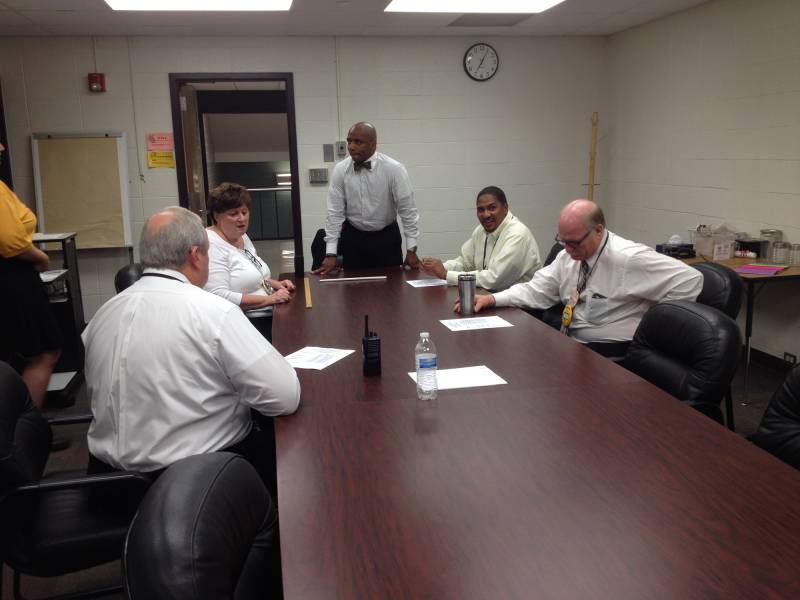
Questions now?
[Student] What school got took over?
[Sandorf] That was Howe, Howe Community High School in 2011-2012. Same time this one was. Four of them were taken. Great question.
[Music Theme - Dust Bunnies]
From WFYI in Indianapolis, I’m Eric Weddle, this is “The Takeover.” The story of Indiana's radical move to save failing schools. Was it worth it? It is not a simple answer. It’s complex, and it’s messy.
This is an investigation of the state’s decision to strip away local control and hire private businesses to turn these schools around.
And to start, let’s go all the way back to ‘the year of school reform in Indiana’ -- 2011.
Chapter 1: The Context
[Tony Bennett at 2011 bill singing] My name is Tony Bennett. I'm Superintendent of Public Instruction. We welcome you to this …
From 2009 through 20012 Bennet and fellow Republican, then-Governor, Mitch Daniels made history with their sweeping and highly controversial school reform policies, including expansive school choice and -- using school aggressive school improvement efforts.
I recently met Bennett at his Southern Indiana home.
[Weddle] ...Just explain where we are while I get my levels set.
[Tony Bennett] This whole office is like memories of statehouse work for the most part. Some of this is stuff I had in the Statehouse. Things we accumulated while we were in the state. But good memories. good people
Many saw takeover as a radical experiment in the 1990s. Indiana hadn’t tried it, but people in this state were looking for options - people like Bennett.
[Tony Bennett] So let's go back. Eric, it's a great question, because I was actually involved with this kind of turnaround work when I was a building principal in Scottsburg.
Years later, after he was elected state school’s chief, nearly 100 schools were rated as failing, there was pressure to do something big, and he did.
His administration used a law -- one that had never been used -- that lets the state hire private companies to run chronically failing public schools. This operator is expected to put in new practices that result in improved student achievement.
[Tony Bennett] Many people forget this. This entire idea is about equity. It's about giving families’ children who have no voice and who have been disenfranchised in education an opportunity to succeed and break generation, break the chains of generational poverty. That was our very idealistic intent.
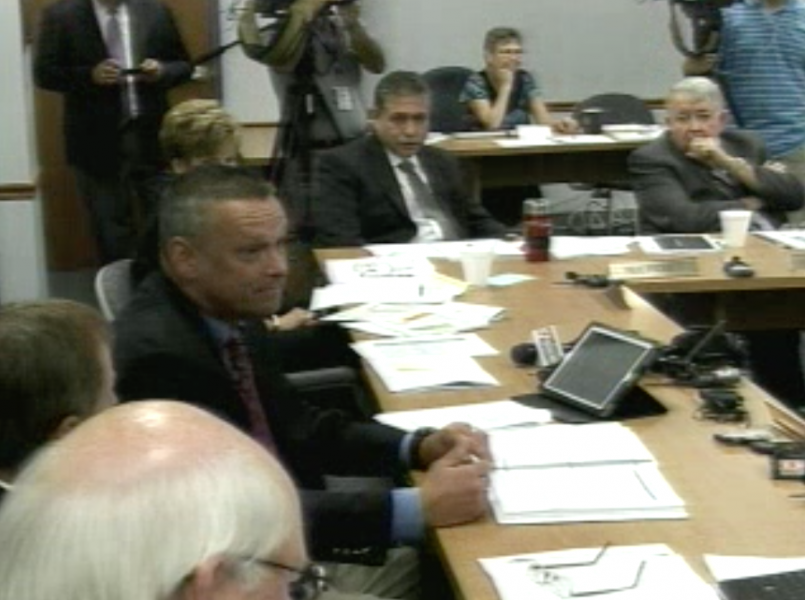
[RTV6 Breaking News] Three private groups officially took over five academic failing schools in Indiana the state assigned one company to a school in Gary. Florida-based Charter Schools USA is under contract to turnaround three IPS schools in four years. They include Emma Donnan Middle Schools and Howe and Manual high schools...
[Kevin Sandorf] We're out there at bus duty. And I know Jeff Strange walked up to me he said, ‘Well it’s going to be over.’
This is teacher Kevin Sandorf at Howe High School describing the day of takeover announcement in August 2011.
[Kevin Sandorf] And I said, ‘What's going to be over?” He said, “They're taking the school over.” And I said, “What are you talking about?” And he shoved the phone right in my face and went, ‘when did…?’ I was speechless.
I can’t overemphasize what a blow this news was for teachers. Math teacher Tina Ahlgren also envisioned a long career at Howe.
[Music - Worlds To Run VIP Dub]
[Tina Ahlgren] I kind of like to compare it to having you know a broken heart being dumped almost. It's been hard to invest as hard in a school as I did at Howe. It's almost like there's a scar there. I mean as you can tell I still I still get emotional about it. I don't I don't think I've ever talked about Howe in the last seven years without crying about it. It was my home.
[Afternoons With Amos radio show Sept. 8, 2012]
[Amos Brown] Dr. Tony Bennett is the Republican incumbent for superintendent of public instruction -- and he joins me live. Welcome. Good to see you.
[Tony Bennett] It is always good to be with you. We missed you at the round table …
Here’s Bennett on the late Amos Brown’s popular afternoon radio show in Indianapolis - it’s a few months since the private companies took over the public schools.
[Tony Bennett] I know I'm on here today as the candidate for state superintendent and that you know I have a lot of folks around me who wondered you know why would we take such a bold action, You know, 100 days before an election and do something the state’s never done, which is take over schools. Knowing that is a pretty tenuous decision …
Bennett went into that election night with most people expecting he would win.
But he didn’t.
[Election night November 6, 2012]
[Glenda Ritz] I am Glenda Ritz and I am Indiana’s next superintendent of public instruction!
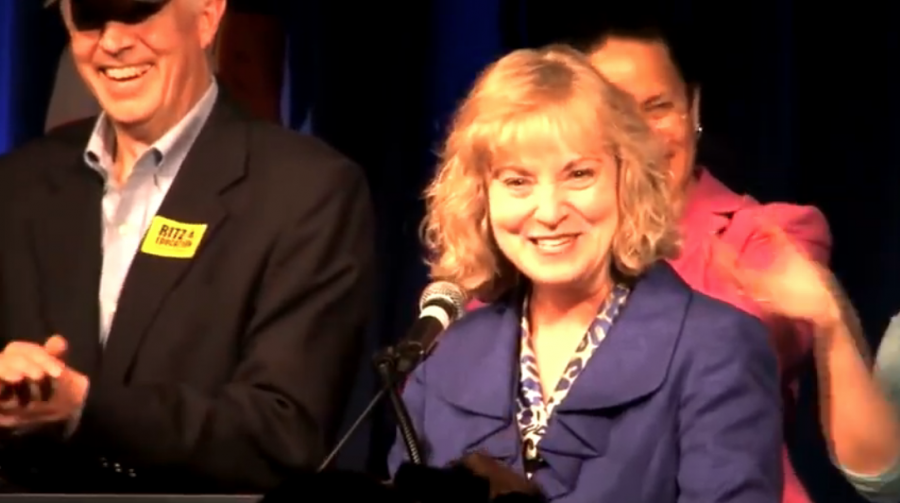
Glenda Ritz was a grassroots candidate and librarian who campaigned against school takeover and other Bennett-driven reforms.
[Glenda Ritz] This race was a referendum on education for the children of Indiana. The voters have spoken.
[Supporters cheering]
Ritz not only beat Bennett, she earned more votes than the state’s new GOP governor -- Mike Pence.
But the reforms she ran against, including school takeover, could not be rolled back. She did push for other schools interventions. But it wasn’t easy.
Ritz was the only statewide elected Democrat. She, Pence and the Republican-appointed State Board of Education did not work together. And that’s a polite way to say it. But those fights are another story.
This story is about two of the schools caught in Indiana’s first takeover. Was it worth it?
[Music Theme - Dust Bunnies]
I’m focusing on two schools -- Arlington and Howe.
Arlington first.
The company hired to run it --- broke the contract.
We’ll go to the classrooms to report on that fallout. But first, a quick pause - Why did it leave?
The problem was money. In Indian, money follows the students. Hundreds left Arlington when the takeover was announced.
After three years the company just couldn’t afford it. The state ordered Arlington returned to its home district, Indianapolis Public Schools.
This was a really big deal. The community, the alumni and the district had fought for this day -- they felt like they owned the school again.
But it’s still a school under state intervention. Officials are demanding a higher graduation rate and test scores.
And it’s not really “back,” it’s restarting. All the staff, principal and most of the students are new.
Chapter 2: A New Day
[Sound of Stan Law talking at Arlington, July 31, 2015]
Three days before school starts -staff are still meeting each other.
[Stan Law] What we are going to do really quickly, some last minute items, then we are going to take a staff picture. You all want to hang around…
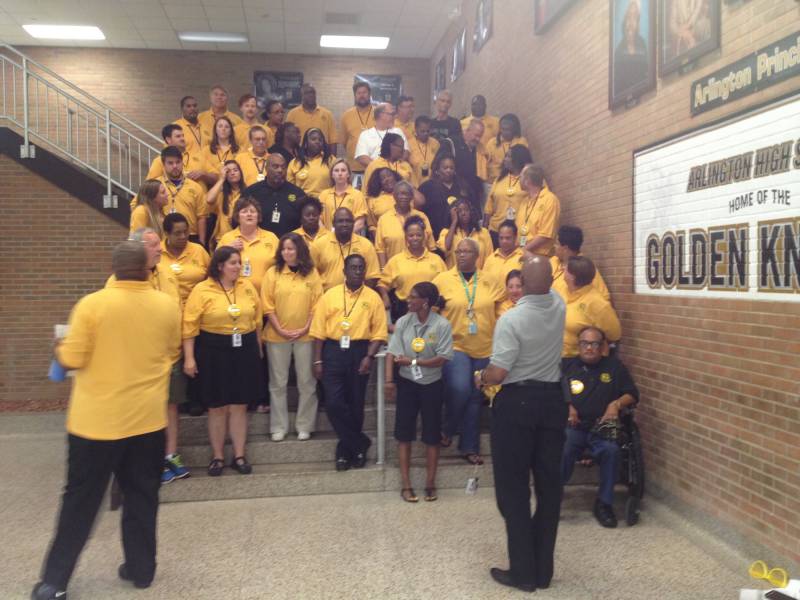
There meeting me too. I’m embedding at Arlington for the 2015-16 school year to report on it’s restart.
[Stan Law] We do a staff picture.
That’s Principal Stan Law.
They all have high hopes for the first year of Arlington.
[Noisy hallway sound]
[Staff member] Better hurry up.
It’s the now second week of school and everything’s in flux.
[Classroom sound]
[Kevin Sandorf] Ok, here we go. Does anybody need a pencil?
English teacher Kevin Sandorf’s fourth-period class is packed.
[Kevin Sandorf] Thank you for doing a good job coming in. I realize we are sitting...there’s 40… 41, 42, 43, 44, 45, 46, 47, 48, 49. Forty-nine people. I think we’ve handled it pretty well.
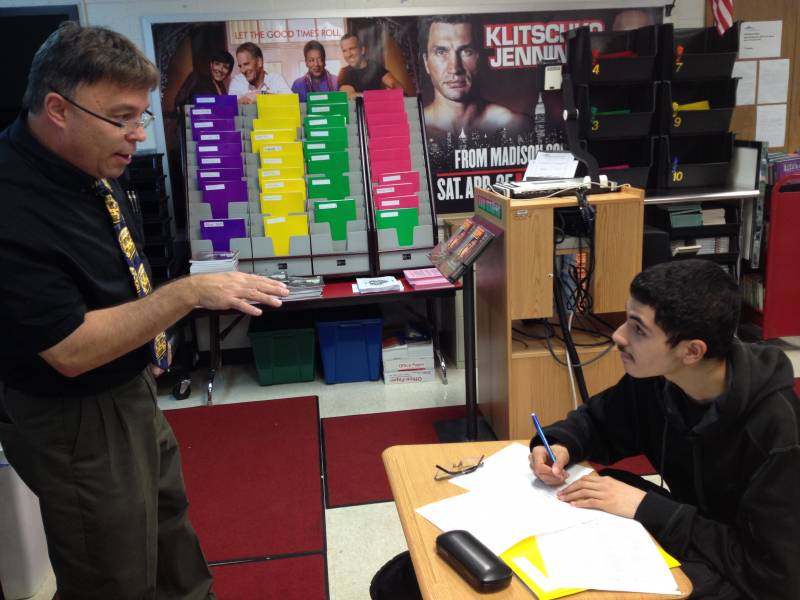
Sandorf is not fazed. He had handouts ready for even more kids and is already moving them to the library.
He’s one of the few veteran teachers at Arlington. He knows how to keep the train on the tracks -- for example, he keeps a pocket of thumb-drives with old lesson plans -- just in case he needs to change things up.
[Kevin Sandorf] I’m trying to be as creative as I can given the confines of that room up there. Which obviously is a little tight for 50 people. Young lady, would you help me out with passing one of those out…
Sandorf puts a good face on it, but he and other teachers are fighting against daily fluctuations of class size, changes to student schedules. A reason for this, the private charter school company, EdPower that ran the school before left many incomplete student files.
[Shelly Parish] Wow… I’ve spent almost a week and a half doing this right here.
It’s now a Saturday at the school -- and guidance counselors including Shelly Parish are sifting through stacks of student files. They are looking for evidence of credits earned but not entered into an online system.
[Paish] It’s multiple, multiple, multiple kids who didn’t have transcripts in and all their credits were sitting in the cume folder. EdPower did not transfer that information on to their transcripts. Which made it very difficult for me to schedule them correctly.
Because of this, some students were stuck in classes they’d already taken -- for weeks.
Another problem is student behavior, and the new staff and students don’t yet have relationships with one another.
While Principal Law aims to give them a college prep-style education, he’s having a hard time keeping students in class.
[Students arguing with Stan Law]
Law is Navy veteran and a 20-year educator. He is bald and on the shorter side. Today’s he’s wearing his signature bow-tie and carrying a bullhorn. He joins school police officers and other staff as they fan out across the corridors to catch dozens of students out of class.
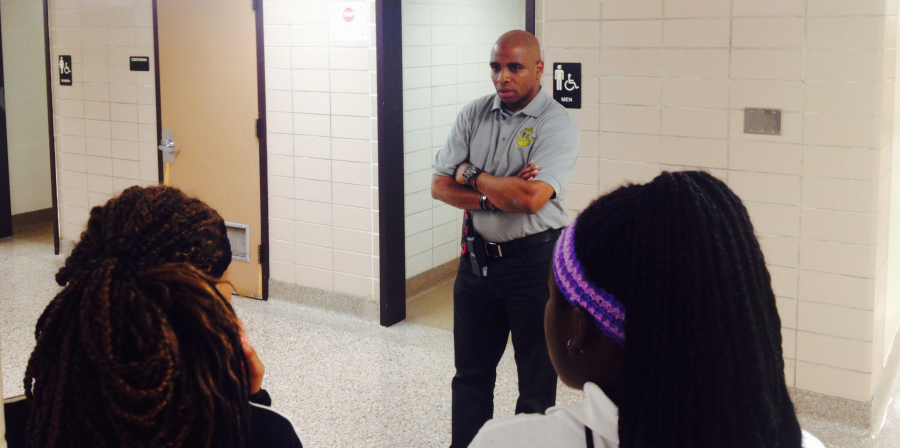
[Students arguing with Stan Law]
[Stan Law] You are walking her to art? Is that what your schedule tells you to do?
[Student] You work here? Who do you work for?
[Weddle] WFYI.
[Student] What do you do?
[Weddle] I’m a reporter.
[Stduent] You reporting on our school? We bad, huh?
[Weddle] I think you guys just need to go to class, I think.
[Student] No, if you were a student… These hallways are long.
[Weddle] I know.
[Stan Law] Who’s here -- H-hall? Correction, C-Hall, first floor.
[Students arguing with Stan Law]
One day a, group of football players nearly collides with Principal Law.
[Stan Law] I don’t care with your excuses are dude, everyone has one. Who gives a jack! That’s your problem. All your life you just rely on excuses. And then you expect for us to be, ‘Oh OK.’
[Justin] (inaudible arguing with Law)
[Students] Stop talking Justin.
[Stan Law] I don’t care where you have class. I bet you won’t be late for your freaking football game, will you?
[Justin] (inaudible arguing with Law)
[Students] Justin, stop talking!
[Stan Law] Well get off… take off your jersey then. And you’re done.
The student players are stunned as Justin pulls off his jersey and throws it down.
[Stan Law] Your attitude is jacked up. You ain’t worth playing football on the team.
[Justin] (inaudible arguing with Law as he walks away)
[Stan Law] I know. I’m going to run you out of here too. Anybody else?
Up till now, Principal Law had been leaning on students athletes to set an example of leadership.
Many he’d known from past years.
But the ongoing daily, even hourly, problems are eating at the staff.
Students aren’t just skipping class, they’re vandalizing the building, smoking pot and just ignoring the rules and their education.
By the end of this day, Law is cooled. He’s joking with a student in his office when Justin -- the now-former football player -- stops by.
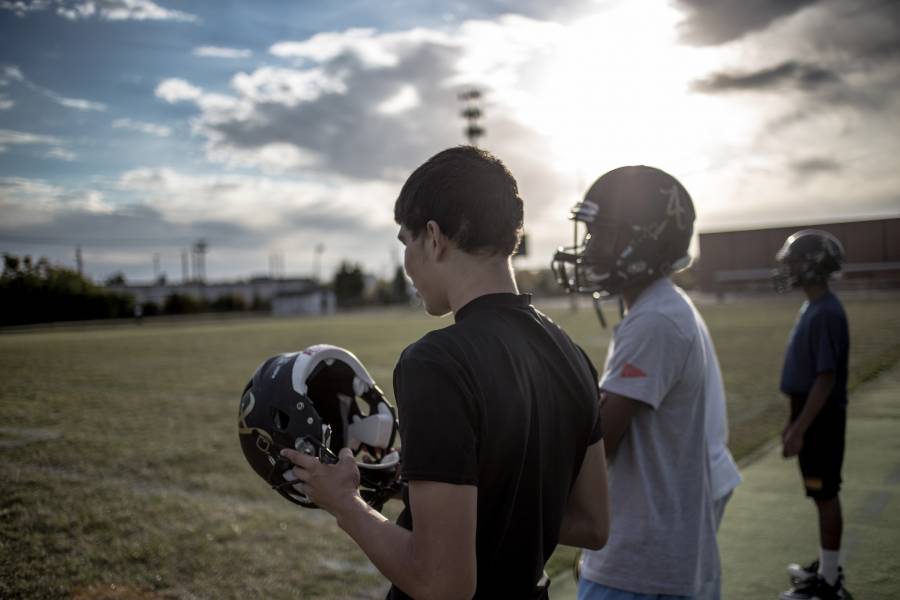
Law tells him, I need you to start thinking ahead.
[Stan Law] I need you to start thinking ahead.
[Justin] I know. But my mouth talks before my head…
[Stan Law] I understand. But listen to me. I told someone the other day. There hasn’t been a war in this world that didn’t start with somebody’s tongue first. If you can’t control and bottle that tongue, you are going to find yourself in a world of predicaments.
[Justin] Thank you...
[Law] First time it is shame on you. Second time, it is shame on me…
[Female student] And Mr. Law have no shame.
Justin is back on the team.
There is little trust between students and staff at Arlington. They just don’t know each other.
The building is beautiful -- but there’s so much in it not working. Like those messy student files.
And something big is hanging over Principal Law’s head --
State officials expect Arlington to post a 60 percent graduation rate -- the highest in years.
This year was supposed to be a rebirth. But so far it’s a continuation of the challenges that caused the takeover in the first place.
In this first few months it’s become clear:
Special education needs are three times the state average.
Many seventh graders are reading like nine-year-olds.
Dozens of students are caught up in juvenile and even the adult court systems.
There’s not enough staff to deal with this -- and half the educators here are first-year teachers.
Chapter 3: A First-Year Teacher
By November I’d embedded in Arlington for three months, and it was evident Principal Law was caught in a vicious staffing cycle.
He still needs a math teacher. A biology teacher just quit. There’s not enough time to support the staff that is showing up. And a lot of them feel like they’re at war with the students.
Principal Law’s attitude became - if these are all the resources we have, they have to be enough.
[Sound of staff meeting]
This is Law at a staff meeting telling teachers to get over it.
[Stan Law] Nobody in this room collectively, stays up thinking how the hell can I make Arlington a better place than I. And I can not do it without you.
But teachers leave anyway. I asked Law about this late in the semester. Here’s what he told me:
[Stan Law] In the end, like I said, I want the right people on the bus. If you feel you are not that person it is ok, no hard feelings, I wish you well. Cause, in the end, you have to service kids somewhere else and pretty much those are urban kids and those kids look like me. So do them well. That is my take on it.
It’s a few days before the first semester ends and I sit down with chemistry teacher Lauren Martin. She’s one in a transition to teaching group at Arlington -- and some want to leave the school.
[Lauren Martin] I knew that this is where I was going to be and I knew that the kids were going to come from hard places. I knew that it wasn't going to be easy. I knew that I wasn't a teacher and I'm going to be a teacher and have to be a role model for all these people. And I get that.
[Music - Happy Little Trees]
[Lauren Martin] I didn't think it was going to be this hard.
[Lauren Martin] Mr. Law talked about, as like an analogy, like, it's like 10 forest fires and you only have one fire truck. And that's really like how everything is. You can only handle so much and there's only so many people.
[Lauren Martin] I feel like I'm a lot more connected with my high school students. At times, they’ll come to me or say, ‘I can eat lunch with you today instead of dealing with someone’ or... It may not seem like anything that's happening but something is. Some little sort of impact.
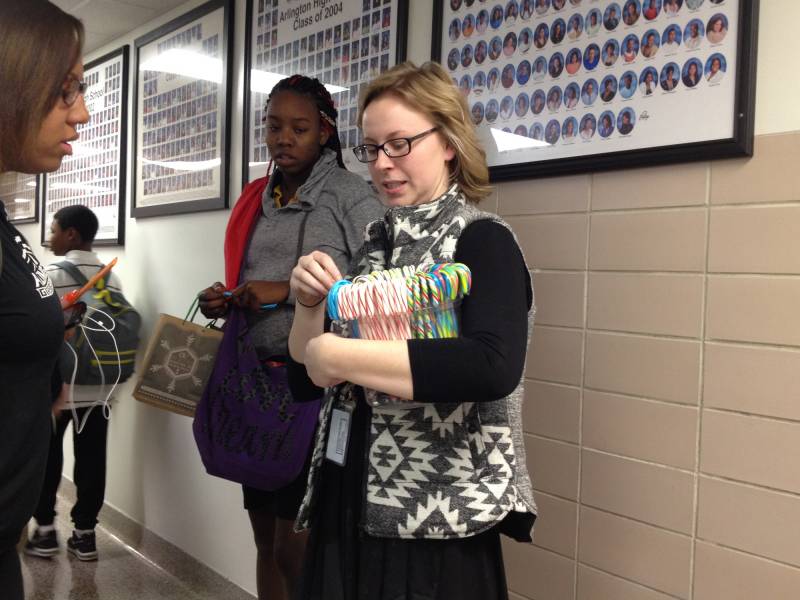
[Lauren Martin] ITF collectively thought it would be better if all of us left Arlington. They contacted other schools and allowed us to start interviewing and go through different processes.
[Lauren Martin] I haven't told my kids yet...until tomorrow or, well, Thursday. I love them a lot. So it's going to be hard… Especially just knowing how a lot of situations like this end up. The math teacher position, they’ve had a substitute this entire semester. I hate that for them. I hate that I’m causing that as well.
Teachers that remain, continue to build relationships and focus students on academics
But some of these students have complicated, even dangerous, lives.
Chapter 4: Jaylan
As I walk into Arlington on February 4th something feels wrong.
It's too quiet. There are students and staff huddled in the entryway and throughout one of the main hallways. There are more police.
I walk up to the second floor. In the hallway, Principal Law is slumped in a chair.
[Stan Law] Hey Eric, how's it going.? Well today's one of those days. You, gotta face... Um, what you him one of those days you just never want us to deal with. But you know it's inevitable in some way.
I got the call last night at around. I was ordering my food at Morton's. I got a call from one of our staff members here hysterical.
‘I can't believe Jaylan is dead.’ What do you mean Jaylan's dead? He got killed. Told me that, you know, found him in a car. Humped over the steering wheel with gunshot wounds.
[Staff member] They say he just bought that car last week.
[Stan Law] He did. He just bought the car last week he was adamant about getting him a car. Just got a job at Texas Roadhouse. I'm sure he just got his first paycheck. And then, uh, so I had them box my food up. And all the call all the people and they and we all went up to the dad's house. Just kind of be with the families. My food is still downstairs. The pork chop, that big ol' pork chop with the mashed potatoes, is still down there waiting to get heated up. Just don't have the appetite for that.
Sixteen-year-old Jaylan Murray had shoulder-length dreadlocks with dyed tips. Everyone seemed to know him for his smile and easy attitude.
He had good grades. Was a running back on the varsity football team.
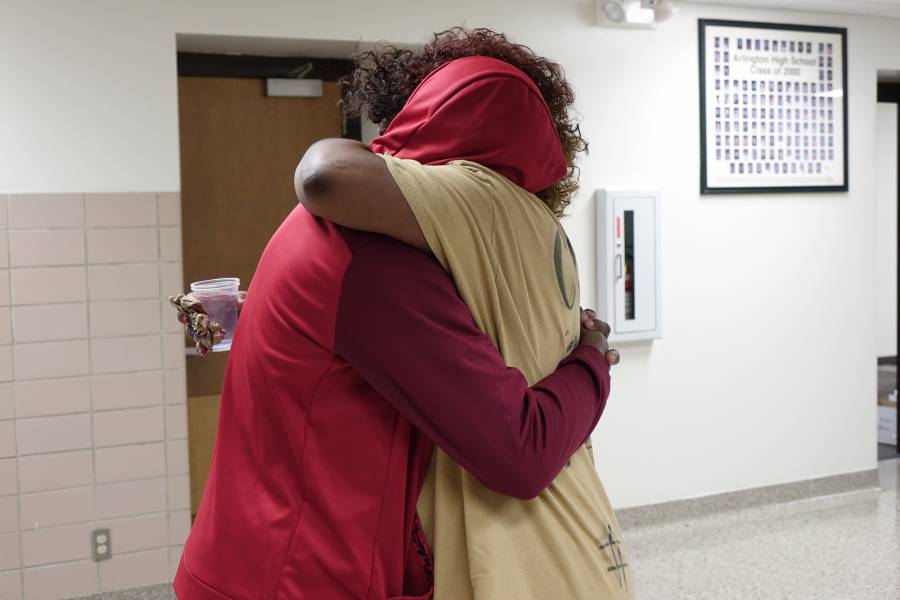
Like many of his classmates, Jaylan’s life was complicated and dangerous. He was the father of an infant son. A lot of people had been pushing him to stay on the right track.
Keisha Ross is one of them. She’s the mother of one of Murray’s best friend. They’re at the school. As I walked towards them, I barely hear what she says to me.
[Keisha Ross] I’m numb. I’m numb, right now. It’s just... I, I’m lost. A loss. It is unreal right now. I can still hear him calling.
She turns to her son and they wrap arms around each other.
Throughout the day, students pay tribute to Jaylan in social media posts, and within Arlington. On one white paper banner, a black ink caricature of Murray "Dredd Head" is written next to it.
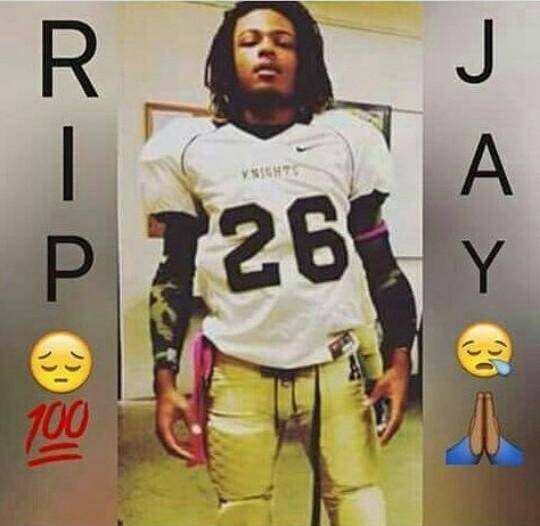
Students and staff are counseling each other too. You wouldn't have expected that a few months ago.
Alyssa, a student who is growing close with some teachers, says Arlington is becoming a family.
[Alyssa ] It is good to be here. Because he was here, like, this is his family. It’s very important for everybody to be here today.
[Female student] He was funny, he was real.
[Alyssa ] Man, I’m talking about - he was stingy though! Cause he never shared known of his snacks. He didn’t share none of his snacks...well, he probably shared like two or three.
[Female student] When he wanted to.
As I leave the school that day, I pass Murray's football coach Steve Moorman. He’s a big guy, a former NFL player, and he looks devastated.
[Steve Moorman] It's just, just a lot of emotions. Just sad, you know what I mean, that a young man, you know, had to leave us, leave this Earth, you know.
Just sad. Just. Just. I mean as a position coach I've had kids who, you know, passed away. As a head coach, you just feel like you just didn't do enough. That's kind of how I really felt all last... I couldn't sleep last night thinking, ‘We didn't do enough or the kid will still be here.’
Maybe that may be a wake-up call. So maybe that's God using him for his own glory. And that's just the way I got to look at it, I mean, seriously.
That's just that's what's going to help me just keep it in that frame of mind.
Before the end of this school year, more friends, relatives, and a boyfriend of an Arlington student will all be killed.
As of this recording, Murray’s death is unsolved going on three years.
Chapter 5: The Finish Line
[Music - It’s All Math]
It’s now May. Less than four weeks of school left. I’m in Principal Law’s conference room with a few of his top staff.
Out the window, we see stacks of the completed state test being wheeled out on a cart.
[Debra Ward] There they go.
You got to pray for those boxes, Law says.
[Stan Law] You got to pray for those boxes. Oh Lord, please, Jesus, help us.
Please, Jesus. Help us.
[Law] For real
The focus now turns to graduation. Principal Law and a team huddle at his conference table to strategize.
There are 51 seniors.
For Law to deliver on the school district’s promise to the state -- a 60 percent pass rate -- he needs 31 to earn diplomas.
Some seniors have credits yet to earn.
Almost 100 seniors and juniors haven’t passed the required math and English assessments. Some don’t want to retake it.
Teaching coach Tina Alghren says a student told her, “I ain’t taking your test.”
[Tina Alghren] For him, it is our test. He has no ownership over what happens there. We have a lot of kids that’s how it is. They see it as something we make them do. As opposed to something they care about and will try and get to help them graduate.
[Debra Ward] Well, how many times are we running after them? Get back here! Do that test!
[Stan Law] There is not or has not been a real focus with these kids, not only from last year but hell, from the elementary years on up to now. I mean, for real, these kids come from some dire daggone situations and they don't see they only don't have an example at home to see that education is important. It is day-to-day survival. That's all it is. Not about building a freaking future. And fortunately, it is our task to be able to do it. And we've got to push to some of the minutiae in order to get that done.
[Debra Ward] I like that word.
[Stan Law] Yeah, I’m trying to watch my profanity.
A week later, I’m at come-to-Jesus-type testimonial Principal Law is giving the seniors.
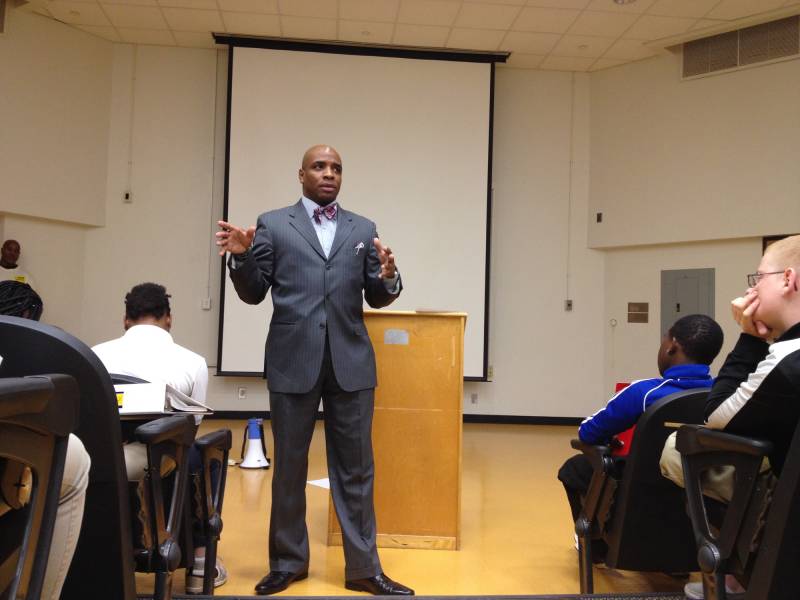
[Stan Law] Well alright you squares… 1, 2, 3, 4, 5, 6….
He turns the screws. You act up, and you are out.
[Stan Law] I will sacrifice the few, in order to save the masses. If you are not taking advantage of the opportunity, seriously. This is your graduation.
[Debra Ward] Yes!
[Hallway sound]
After the meeting, I walk out of the small auditorium behind Law and Ward.
They spot a student -- one who runs away, even hides, to avoid retaking the graduation test.
Law grabs him by the arm and pulls him into the projection booth. Ward and I follow.
[Stan Law] Why didn’t you go to testing this afternoon?
The four of us are now standing in the projection booth - the size of a large closet. That blowing is the air conditioner.
[Stan Law] I've been trying to work with you for the longest. I had Ms. Patton call your mother, tell your mother I'm pulling your work permit. As of right now you're suspended for any after-school events...
Law then threatens to take away all of his sports if he doesn’t take the test.
[Stan Law] Until you figure out how to get it together.
[Student] Alright.
We all leave the booth.
[Debra Ward] You know what? We’ve had so many adversities.
And for the seniors, they need to pass the test now. And some, like Alyssa, need more credits to graduate.
They use an online credit recovery program called Ingenuity. That means, they’re being tested on a computer over and over, until they get it right.
Alyssa says her eyes hurt.
[Alyssa] Yeah. I do it at home, during the day. I'm so tired of looking at Ingenuity. It's like that's all I do is look at Ingenuity. I remember these days when I took two days. I didn't go to no classes. I sat in front of an Ingenuity computer for them two days. I was getting the work done…
Alyssa was at Arlington during the takeover. She didn’t like it. I asked her if she was glad she came back.
[Alyssa] At the beginning of the school year I would've said no. But now, yes. I'm happy that I decided to stay here.
I heard Alyssa’s name a lot during my time at Arlington. In the hallways. During staff meetings. Usually, it was someone talking about what she needed to do.
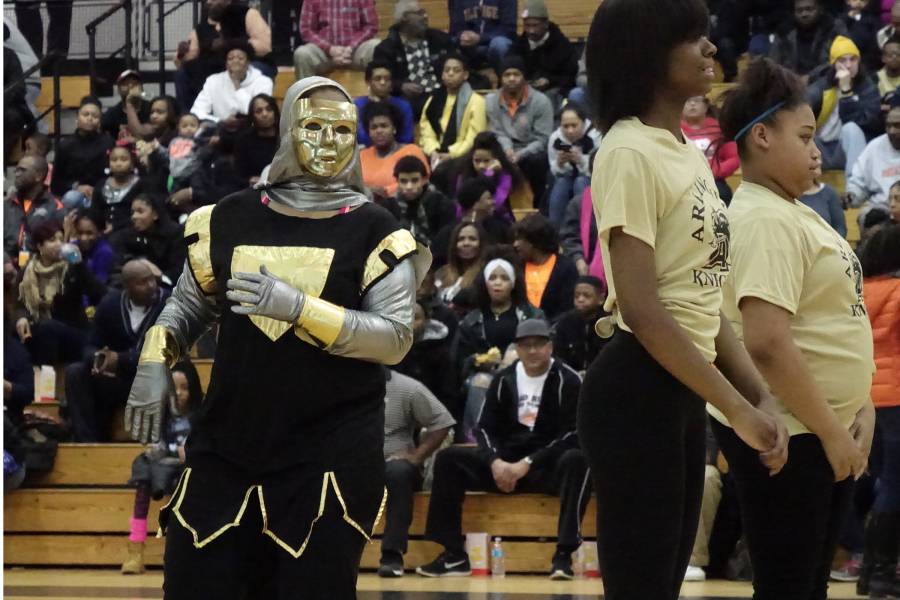
Ishea Billups -- the school’s English coach -- was usually the one responding. She first met Aylssa, when the 17-year-old was about to drop out or be kicked out of school.
[Ishea Billups] It was something about Alyssa. I just wanted her, I could see she was just rough around the edges but I think also as you hear people talk and things like that, sometimes people count out not just kids, but people in general, and she was counted out. Those are the type of children I like to help, those who are counted out, because you shouldn't count out any child.
The other night, Alyssa completed her final credits and she can walk.
It’s now hours before commencement, and we’re sitting at a table in the media center. Alyssa smiles and agrees as Billups tells me this story.
[Ishea Billups]... so I think she was counted out just because of her, not even her appearance, it's what she would give people. She was just so, the only word that I use and I still use it with her now, she is aggressive, you know?
[Alyssa] Yes.
[Ishea Billups] She is aggressive, so I always have to tell her, "Alyssa stop being so aggressive.
[Weddle] Do you think you'd be here right now graduating today, with a scholarship, without...
[Alyssa] No, no, no, no, no. Do you remember I was gone drop out? I was getting ready to drop out after at the beginning of the school year I had got jumped. I was gone drop out, I was done. I was done.
[Ishea Billups] I think that was another breaking point for us when she had that moment it was all bad, and she was fighting, and she got jumped. I was just like, this cannot be your path, you know?
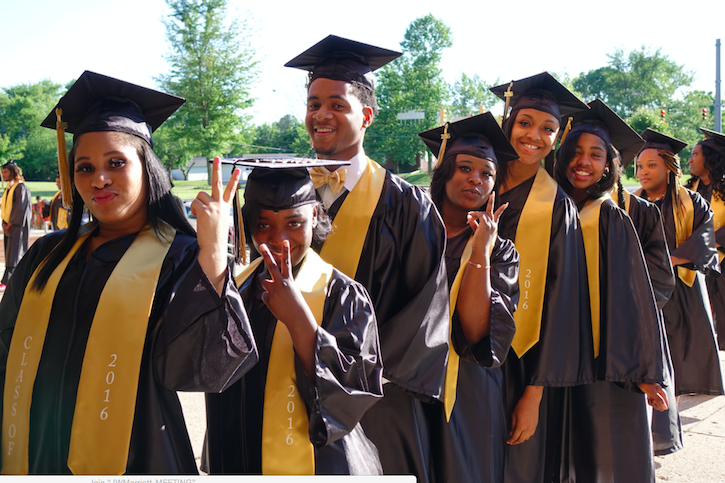
I have to thank Mr. Law too, because even though she doesn't think so, Mr. Law never counted her out either. He never did, but he shows very tough love, and yes he did almost kick her out of the school, and I did have to save her. I had to beg him to keep her here, but he definitely saw the potential in her as well, but he had to come from a different angle. Without him allowing me to make sure she stayed here so I can help her, so we have to thank him too.
[Music Theme - Dust Bunnies]
On June 8, 74 percent of the class of 2016 graduated. It nearly doubled from the year before.
[Commencemnt ceremony sound]
[Arlington Alumni President Tim Bass] Tonight is truly a miracle on Arlington Avenue.
[Stan Law] Alright!
[Arlington Alumni President Tim Bass] Because there was so many doubters that didn't believe that many of you would be here tonight -- but you -- you prove everyone wrong.
[Commencemnt ceremony sound]
But despite successes, Principal Law and the staff ran out of time. The problem? Money and enrollment. Like the private company that started Arlington’s turnaround, with state takeover, the district didn’t have enough money.
[RTV6 News Rafael Sánchez] Erica, it is the most vocal protest we have seen so far. As you can see, three alumni from Arlington are here, the other 50 or so have gone inside the church because the meeting is right now underway. This is all about IPS’ plans to close three of its seven high schools to save about $4 million a year…
After that comeback year -- Arlington closed two years later. Principal Law and some of his staff transferred across town to remake another high school.

Arlington is now a middle school with a new principal and staff.
The second half of this story: A private company from Florida -- Charter Schools USA -- was hired to turn around T.C. Howe High School, Manual High School and Emma Donnan Middle school.
I’m going to focus on Howe - seven-years into its takeover. While it had many of the same challenges Arlington had. It had more time.
It’s on the near east side of the city -- six miles south of Arlington.
This next chapter is about a Howe student named Michael.
Chapter 6: Michael
[Weddle] The only thing I ask is when you talk into the microphone, that you lean into it.
[Michael Hendon] My name is Michael Hendon. I graduated in 2014 of Howe High School. I was 15 at the time when I was a junior and the takeover happened.
I met Michael after he contacted me 3 years after he graduated.
He’d been a student at Howe before and after the state hired a private company to improve it
Michael wanted me to read his first-hand, 88-page account of life at the school.
[Michael Hendon] I would write down a list of questions like on lined paper I’d ripe like a page piece paper out and write maybe four questions...
He emailed me a word doc filled with interviews of students and teachers.
[Michael Hendon] I’d pass them out literally. And a class that we wouldn't be doing anything in and I said, ‘Guys trying to do something trying to you know make something happen. Just give me your honest opinion on whatever.’
[Music - Taroko]
Two things were clear to me as I read it.
First -- he loved Howe High School.
[Michael Hendon] It was just so bright just pulling up into the street, Julia Avenue. It was just, I liked it, I loved it actually. We were just we were a family and it was everyone was pushing for the students to go higher.
The second thing I learned --- Michael hated school after the takeover. The most painful part of it was the loss of the teachers he grew to love -- they were gone. The company replaced them.
And some new teachers didn’t stay long.
[Michael Hendon] We were taught calculus by four different teachers. In the end, the middle that you know there was no teacher at all. So we just basically kind of like wandered the hallways or didn't have to come to class because it was the first-period class.
I don't remember you know having homework after the transition, now that I think about it. It was pretty much all in-class assignments, all in-class, open book.
Michael says they felt tricked by the company running Howe -- Charter Schools USA --. He says they were promised a new curriculum on par with top schools.
But they didn’t see it. For example, he says there were no AP classes that the first year.
[Michael Hendon] These promises weren’t going to be kept at all. And I think it was probably like a ploy to get students maybe to stay or to come back.
He graduated. Michael was the valedictorian. And he went to Purdue University.
But he says he was not prepared when he got there and struggled with assignments. I asked him if anything in those last two years at Howe was positive.
[Michael Hendon] I’m trying to think, you know, I don't want to just speak so negatively about the situation. I'm trying to think maybe a promise that they did keep but I can't really think of one at the moment, really.
[Weddle] And when you got to Purdue when and you kind of realized this, what did you have to do then? Did you have to seek help? I knew you had a friend who was helping you. Did you have to to seek help? What did you do?
[Michael] I immediately had to go to office hours for some of my professors. Like I would be in my professor's office every day. I would email my professors, like ‘hey, I’m not getting number two, can you walk me through it?
In his account of the takeover, Michael writes, he wasn’t taught “any methods or tools to help sustain a passing grade in a Purdue University course.”
There’s data that backs up what Michael says. Indiana tracks how prepared high schools grads are for state colleges.
So I looked up Howe’s data.
Less than half of Michael’s 2014 class went to college and of those, more than half needed some type of remediation at college. The average first-year year GPA -- 1.9 out of 4.
[Music - Taroko]
[Weddle ]As you wrote this, was this therapeutic for you? Did this help you?
[Michael Hendon] Yes. Most definitely. Cause I was angry. I was so… Especially during my senior year. Just seeing the other enjoyment other students were having. I was happy I graduated only happy finally didn't I have to go back to school.
[Weddle] Do you think back to this time? The before and after?
[Michael Hendon] All The time. Yes.
[Weddle ]Why so?
[Michael Hendon] Because I get, um… I just had a dream not even like two days ago, really. about my high school actually. There are so many things I wish I could go back and just relive the moments before the takeover.
Chapter 7: The Deadline
Years after Michael graduated, Howe High School remained an F. I didn’t embed there, but from what I heard, it had many of the same problems Arlington had -- low test scores, low graduation rates, a feeling of chaos.
At the same time, the state was impatient - why aren’t these schools turned around?
After some debate it gave the company running Howe --- Charter Schools USA -- a deadline -- a year and a half.
[Auditorium sound]
And this it the person in charge of meeting it, on his first day at the school - Principal Lloyd Knight.
[Lloyd Knight] My name is Mr. Knight and I’m going to be your principal this year.
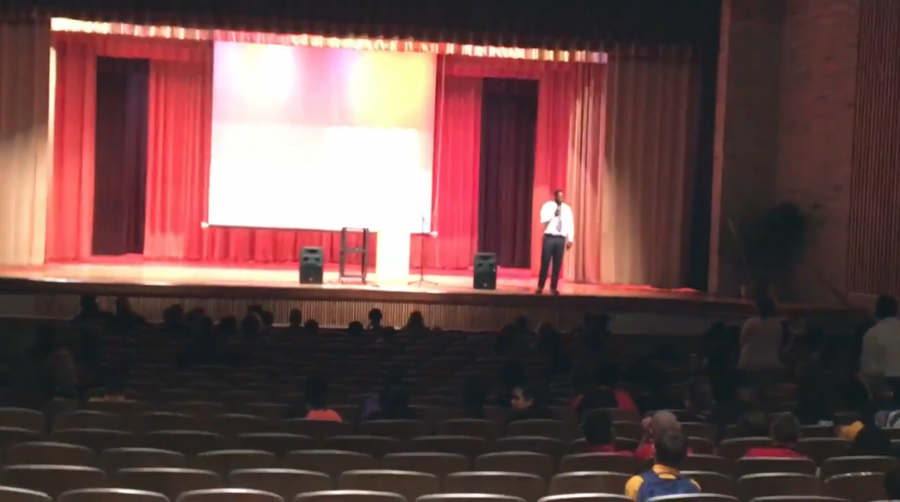
Knight was the 4th principal in six years. In this YouTube video, he’s introducing himself to the students. The then 35-year-old stands on the stage. Most of the seats are empty. Some people are talking.
[Lloyd Knight] The thing I want you to hear before we get to...Hey, I want all eyes on me. Young man, eyes on me.
Ernest Tucker is a coach and staff monitor at Howe. He remembers trying to get the students to pay attention to Knight’s speech.
[Ernest Tucker] So as a staff we start like, ‘guys, come on, come on, get quiet.’
And then Knight said this -
[Tucker] And as soon as it got quiet, the first thing he said was…I love you.
[Lloyd Knight] ] We love you.
[Muffled laughter and groans]
[Knight] Hold on, you know what. I know it sounds corny. I know it sound different. But I need you to pay attention.
[Ernest Tucker] Being a public school, a city school, everyone lookin’ like ‘love?” So everyone busts out laughing. All the kids: ‘Love? This guy is not going to make it.’ And even some of the teachers look like, “Why? That’s the first thing you say when you get the whole school quiet is -- we love?’
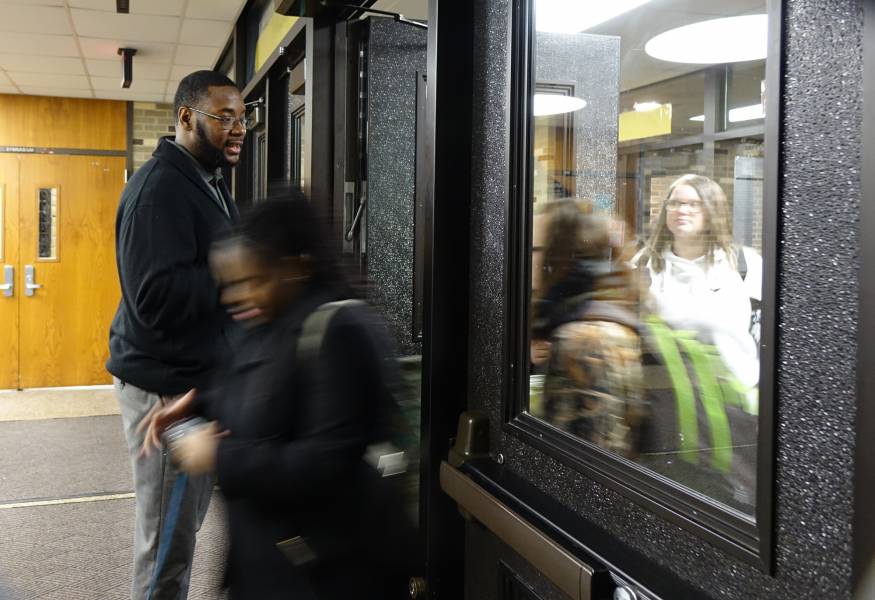
Knight already worked for Charter Schools USA. They brought him to Indianapolis to basically turn around the state’s longest failing school in a year and a half. And some doubted he could do it.
[Sound of Lloyd Knight getting students]
That was last year. Tucker says Principal Knight showed the love every day.
[Lloyd Knight] Morning everyone, it is Tuesday!
It is January 2019. Knight still personally greets the more than 600 students as they walk single-file into the school each day..
[Students walking into school]
He makes jokes, gives reminders, the occasional tight arm around a student’s shoulder to get a whiff of what smokey imprint could be on a jacket.
[Student] You don’t remember my name.
[Lloyd Knight] Good morning, Miss Doughty.
[Student] Oh!
[Lloyd Knight] Morning, morning. Dustin. Good morning, Destiny.
We are now just ahead of the State Board of Education vote that will determine if Howe will stay with Charter Schools USA, close, or go back to the district.
Did Knight succeed?
Chapter 8: What is Success?
[Music Theme - Dust Bunnies]
[Lloyd Knight] We need to have the time necessary to show you what we can really do...
This is Principal Knight again.
[Lloyd Knight]... and that's why I always, when I go to community meetings, I invite people to come in walk through our building, see what we're doing, see our students and then ask yourself, ‘Does this feel like a school that needs to no longer be here?
And if anyone were to tell me that they still feel that same way I would 100 percent respect them because we are an F school. We own that. But I truly believe that we have amazing things on the horizon….
[Sound of the academic meeting]
If you took Knight up on his offer to visit Howe, you would see that the teacher’s lounge doubles as a sort-of academic war room. The entire back wall -- painted in large columns of red, yellow and green -- is covered in sticky notes. There’s a note for every student that details their current scores.
[Paige Pittman] These kids need this test to graduate if they don't have it, they're not going to graduate.
This is assistant principal Paige Pittman. She’s in charge of academics.
[Pittman] And please be creative in the way that you are teaching it, cause I don’t want the kids to every feel like we are teaching to a test. And I honestly don’t even like the idea of teaching to a test. But we have to look at the data, we have a responsibility to look at the data. Because our responsibility is getting our students to progress from one grade to the next. And you can do that, without looking at it.
Knight also introduced a management app typically used in elementary schools to promote positive behavior.
Teachers reward points with a few taps on their smartphones.
[ClassDojo sound]
[Male teacher] Because he did something out of the ordinary, just…
[ClassDojo sound]
Positive points for things like classroom interaction and helping each other. Negative points for things like disruptive behavior and being out of uniform.
[Lloyd Knight] If you are not sweating the small stuff in the population of students we serve -- it is chaos. If you do not acknowledge those students or giving them praise, they are going to find a way to get it. Whether you want it to or not.
Students earn more than three times as many positive points than demerits.
And students aren’t the only ones held accountable.
[Classroom Sound]
[Ernest Tucker] Hello hello hello…
One afternoon, in late January, monitor Ernest Tucker began his daily checks. He periodically visits classrooms to spot issues teachers may have overlooked.
And here, he spots a student wearing the wrong type of shirt. Tucker taps his phone to send a report on the teaching assistant to the main office. She objects.
[Teaching Assistant] Why should that affect me?
She says the student just arrived in her room from another class. He disagrees.
[Teaching Assistant] Oh, you got to be joking Tucker!
Tucker doesn’t change his mind. And leaves for another class.
[Ernest Tucker] Sorry… have a blessed day. I love you guys.
[Teaching Assistant] You are walking away and you gave me a demerit!
Principal Knight is quick to point out many of the rules aren’t new. But he says having a system of enforcement -- for students and staff -- is key.
[Lloyd Knight] We came in with simple simplistic stuff. I told kids they couldn't curse anymore. So, for the most part, they stopped, right? I told students that we're going to expect them to learn every day. We're going to supervise you every day. And when they saw those things happen, I think that had an impact. I dont think there was ever a magic bullet. It was along the lines of, like, ‘Are you willing to go to the furthest degree to hold stakeholders accountable for the education of our children in this building?’
Expulsions are down. Test scores and enrollment is up. Graduations rate is 92 percent.
That seems like a success.
Now you may be thinking -- why didn’t Arlington see this?
I wondered that at first too.
But you can’t compare the school.
Principal Knight got Howe five years into the takeover. Even though keeping teachers is still a problem -- Howe already had a core of dedicated staff ready to back Knight and fight.
Arlington didn’t have enough time to grow that. Principal Law started with new staff and problems like incomplete student records.
It takes time to restart a school.
Chapter 9: Another First Year Teacher
The staff who’ve worked at Howe for a few years now talk about an “Old Howe” and a “New Howe.”
“Old Howe” refers to the five years of state takeover before Principal Knight. A tumultuous time with bouts of unstable leadership and continual struggle.
Assistant vice principal Laci McKenzie who also taught in the schools, says teachers were being eaten alive by the environment.
[Lacie McKenzie] In previous years it was like this daunting task every day of like adults didn't know what was going to happen. Kids didn't know what was going to happen. No one knew what the day was going to look like.
I’m sitting with McKenzie and Principal Knight is a conference room.
[Lacie McKenzie] And I think that people were coming in and pouring everything they had into like these kids that like they didn't have anything to fall back into them and like they would literally get burned out and like a week.
[Lloyd Knight] How many teachers did you see from your time here -- come and go?
[Lacie McKenzie] I think that between my first year and my last year in the classroom, so in three years, I think that we counted 115 teachers and staff members.
[Lloyd Knight] So like and many of them left, like some left in the middle the day just like goodbye and left.
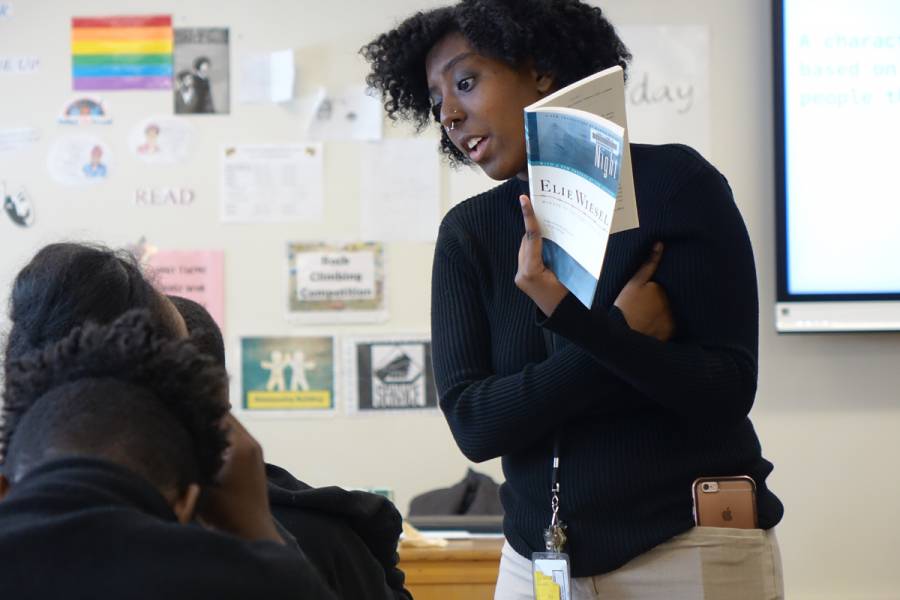
[Wala Hassan teaching sound]
[Wala Hassan] Alright. We are grabbing a book and paper from the back table and we are in our assigned seats in ten, nine we are in our assigned seats, in eight ...
English teacher Wala Hassan came to Howe through Teach For America -- a transition-to-teaching program where recent college grads make a 2-year commitment to urban schools.
The Georgia-native earned a degree in theater. In high school, she was in all AP classes. Howe’s a little different.
[Wala Hasan] We have like kids who came from other schools where they might have gotten like like they went to tougher schools where they got kicked out for less forgiving things. And so when we when they're here it's kind of like the idea of, O’h well you know what I'm going to hold you accountable and yeah maybe today I'm going to ask you to go step out but then tomorrow we're going to start all over.’
[Wala Hasan] And I think that that and being here, because so many people leave, has definitely earned respect with the students and has been helped me be able to kind of get their attention.
[Wala Hasan] We have so many systems in place the way that we run is more like a machine and less kind of like a weird catchall. So, I would say the way things kind of work around here are better than the schools I went to. I went to school in Gwinnett, which is one of the better counties in Georgia for schools.
[Wala Hasan] I think the Old Howe, what we all call it, everyone refers to as like the Wild West. Where it's like you're on your own you come in and, ‘well.”
[Wala Hasan] And I know we still have that reputation because every time I say work at Howe everyone is like, ‘Oh wow, good luck.’ Which I mean I'm not from here. I was like, ‘I don't know what that means!’ But I think I feel like, yeah we're fine.
And right now, Principal Knight is trying to convince the community that they are going to be fine.
How do you convince a community to support a what they see as a failing school?
Chapter 10: Big Reputation
[Sound of November 13, 2018 meeting]
[Man] Thanks for all being here. For anyone without a seat, there’s a wonderful table upfront.
This is a community meeting about Howe’s future.
It’s in the school’s cafeteria, people form groups at the lunch tables - residents, students, staff at Howe. Each group has questions to answer, including -- should Howe become a charter school, close or return to its home district.
I go to a table near the back --
[Margaret Banning] It was closed for many years. It was a middle school for a while.
Margaret Lawrence Banning is a longtime Irvington resident.
[Margaret Banning] It’s been on this failing trajectory where most people who live in the immediate area don’t send their kids here.
[Joe Zwiebel] First off, I understand that 100 percent.
Howe teacher Joe Zwiebel.
[Margaret Banning] I taught here during my first two years while we were struggling. If you all have the enrollment data, you will notice that...
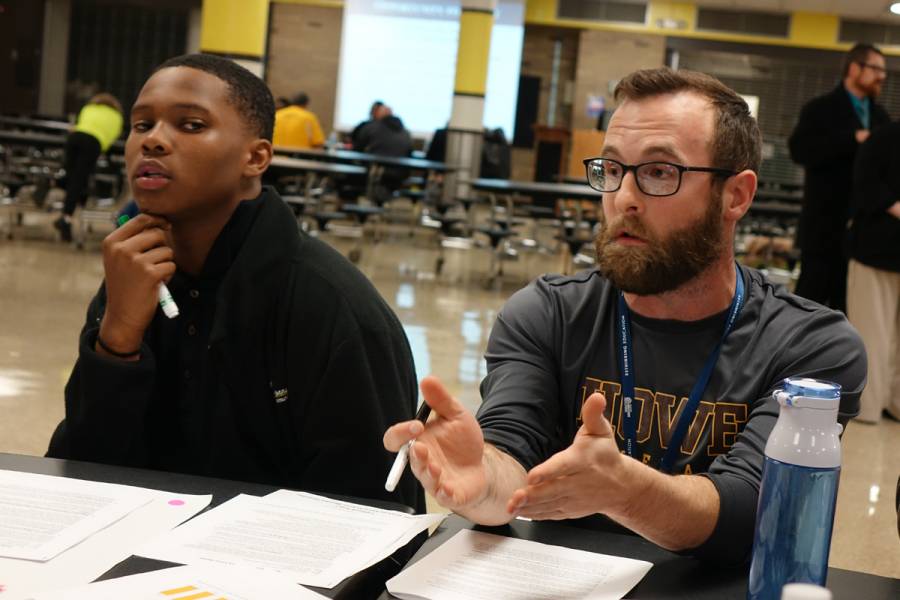
He’s been at Howe for almost four years now. He lists the improvements in test scores, higher enrollment.
But Banning, the resident, he says enrollment is still far below pre-takeover numbers.
[Margaret Banning] Enrollment. That’s people voting by taking their children elsewhere.
[Joe Zwiebel] For sure, for sure.
Stephanie chimes in next. She’s a junior who's been at the school for five years and she likes the new college prep courses.
[Stephanie] Also we have great teachers who encourage us to do the best we can and be the best of ourselves. It like amazing. We have so much help here.
Banning says she gets it. Howe’s better than it used to be. But is it better-enough?
[Margaret Banning] I’m not in favor of the way that there is so much reliance on tests -- but that is what it is.
You have to look at data, you have to look at test scores. Anecdotes are nice and they make you feel good about being here but that is not what’s persuading anybody.
Chapter 11: Turn Around?
CS-USA is the private company that runs Howe. It also runs two other Indianapolis takeover schools.
Jon Hage founded the for-profit company in Fort Lauderdale, Florida in the late 1990s and ran it with his wife Sherry.
I interviewed them the day the Indianapolis CS-USA middle school moved off the failure list with its first C grade, and Manual High School earned its second C.
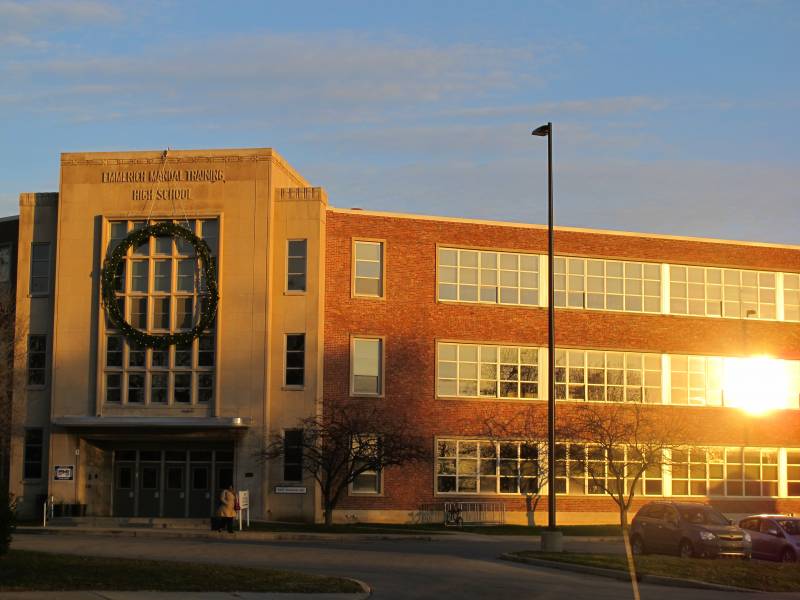
So I asked, did you do it -- was Manual High School successfully turned around?
[Sherry Hage] Absolutely. We're not done yet obviously, but yes. Academically the school has made great strides.
The Hage’s say their on the cusp of doing what Indiana hired them to do: turn around three long-failing schools - even Howe.
[Sherry Hage] This time next year you're going to have all schools moving in the right direction -- off of that failing list. And that's just a big darn deal.
But at what cost?
I tell them about Michael -- the student who attended Howe before and after the takeover --- the period before Lloyd Knight became principal --“Old Howe.”
If you remember, Michael blames CS-USA for not preparing him for college. Here’s a quote from that interview earlier. He even mentions Sherry by name.
[Michael Hendon] We would asked these things, Sherry would smile and it was very reassuring and she would say you know, ‘We're taking care of that. We will make sure this happens by next semester. We will make sure this happens by next year.’ And eventually, we knew these were empty promises.
I told the Hages about Michael’s experiences and asked if they should be evaluated on that too?
[Jon Hage] So let me speak to that because you know I don't make any excuses. If there was a lack of know-how in turnaround -- I don't think anyone in the country had a lot of experience in it. If there was experts doing it they'd be doing it all over the country successfully. And so we took a big chance.
Hage says there’s a lot of blame. The district fought bitterly with the state and CS-USA. There was a lawsuit.
[Jon Hage] Did we learn things. Absolutely. Did we make mistakes? Yes. Do we still make mistakes? We do. We didn't go in from the beginning saying we had all the answers and but we did go in with an idea that said we're going to make sure we get to the answers.
Before we close this chapter, we need to talk about money. Like, the company that ran with Arlington, CS-USA saw a big enrollment dive after the takeover was announced. Years later it still isn’t up to pre-takeover levels.
Remember - money follows the students.
[Hage] There's never been profit. There's never been enough money to pay us back what we've put into the schools at this point where we're several million dollars easily in the schools that we will never recover.
Getting financial documents isn’t easy. It took me months to get CS-USA audits because no one in state government had them.
What I found was, the company put nearly $5 million dollars into the three schools during the past six years, just to keep them operating.

Despite the loss, CS-USA wants its new spin-off company, Noble Education Initiative, run by Sherry Hage, to manage the school permanently.
Next month, the State Board of Education will choose one of three options for the CS-USA takeover schools. For Howe the choice is -- close the school or merge it with another school, ask the company to run it as a charter school, or return the school to the home district, IPS.
IPS leaders have said, if they get back Howe and Manual they will be closed.
Chapter 12: What’s Next?
Indiana isn’t the only state to take over schools for academic failure. It’s been happening for more than 20 years across the country.
But as the debate over how to do turnaround continues, there seems to be less appetite to repeat this aggressive reform in Indiana.
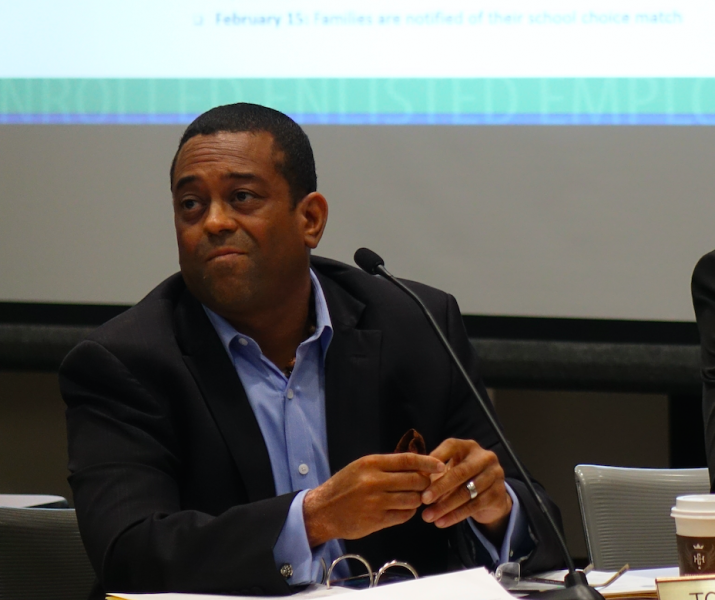
Tony Walker is on the state board of education. In 2011, he wanted the takeovers to happen.
Recently, he said he’d rather the board shut down a failing school than use state law to take it over.
Indiana policy has shifted alongside Walker.
[Tony Walker] School corporations need to own it. If there is a problem, with the education in your district it’s a problem you created you need to fix it. The whole idea that the state can come in and fix it for a school corporation is false.
Local school districts are now pressured to make their own interventions by hiring outside partners to fix failing schools. Districts now get only a few years of failure -- not six -- before the state takes action.
Tony Bennett -- Indiana’s former state school chief who oversaw the takeover -- continues to follow the schools’ progress.
I asked him if he could do it over, would he still push for the takeover of the five schools.
[Tony Bennett] I mean, I would absolutely. We would make the same decision to intervene. Would we take different strategic and tactical steps? Yeah, there's no question. Looking back I still believe that we have an obligation to children and communities to intervene and improve schools. I think that's a moral and legal obligation the state has. Has anyone gotten the process perfect across the country? No. And we have to learn from each other we have to talk.
The decision for Indiana to again take over a school, isn't far off. Next year -- more are expected to be eligible.
 DONATE
DONATE




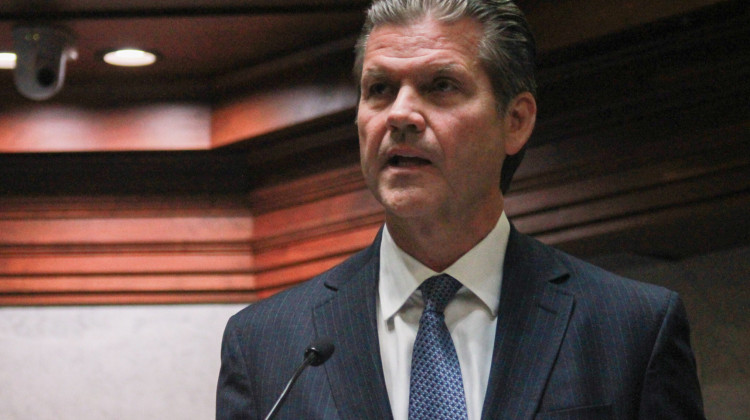


 Support WFYI. We can't do it without you.
Support WFYI. We can't do it without you.